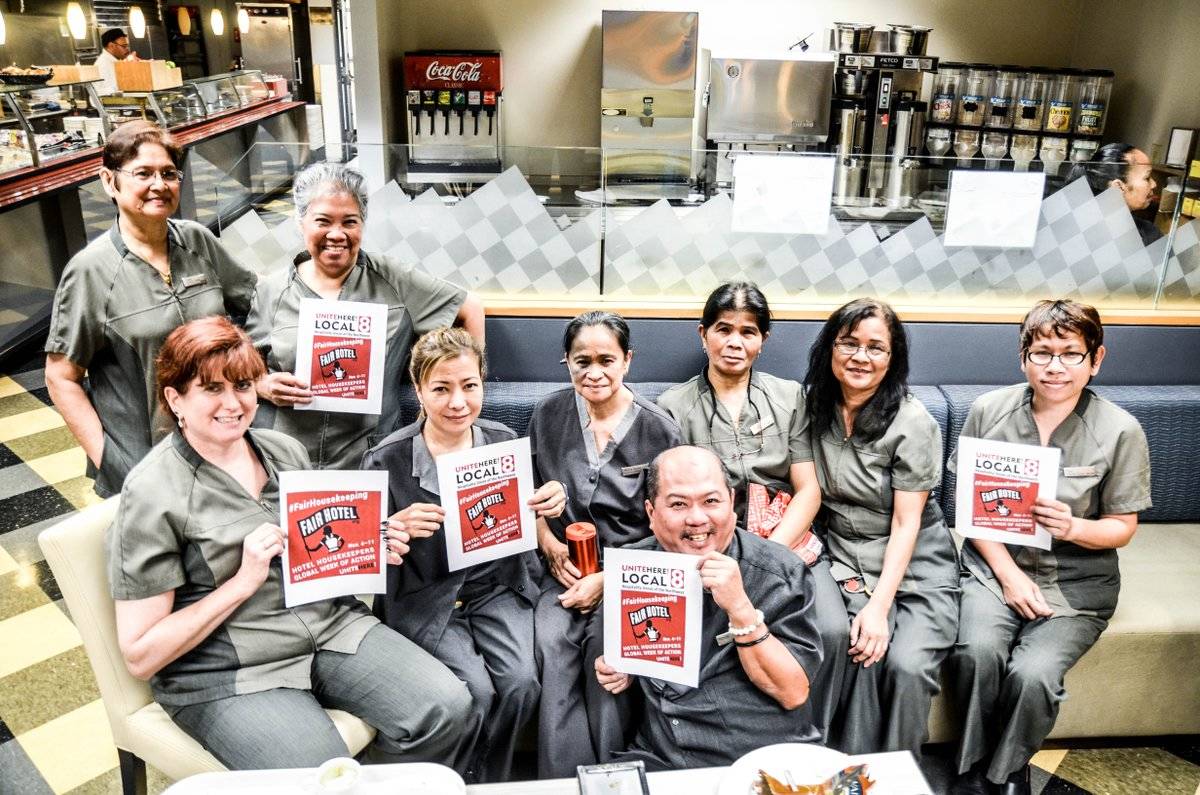While Initiative 124 — a union-backed measure designed to protect hotel workers from sexual harassment and workplace hazards — passed on the 2016 ballot, the full rollout for the new law has been anything but swift. On April 9, the Office of Labor Standards (OLS) released proposed administrative rules for Hotel Employees Health and Safety Initiative (Initiative 124) after its framework remained in limbo for over a year. Now the public has the chance to weigh in with their own suggestions.
The proposed rules for I-124 were the result of several months of discussions between OLS, hotel workers, their advocates, and representatives for hotel employees. The rules provide a framework for the implementation and enforcement of the initiative. I-124 requires hotels to offer workers panic buttons, limit housekeeper workloads, and improve access to health care, among other provisions.
Studies show that hotel employee workers throughout the nation are vulnerable to increased rates of injury and harassment that often goes unaddressed. A 2010 American Journal of Industrial Medicine study showed that hotel employees are 40 percent more likely to be injured on the job than any other service sector workers. At the local level, a 2016 Puget Sound Sage survey conducted of downtown Seattle hotel housekeepers revealed that 53 percent of the total respondents reported experiencing sexual harassment and assault on the job.
For those reasons, nearly 77 percent of Seattle voters approved I-124 in November 2016, but a December 2017 Seattle Weekly report showed that many hotels weren’t following key provisions of the ordinance over a year later. At the time, Unite Here Local 8 organizers told Seattle Weekly that rollout of the ordinance throughout the city had been inconsistent, with some hotel housekeepers reporting that they had received panic buttons while others hadn’t. Ely Dar, a Westin Seattle hotel housekeeper, told Seattle Weekly that her employers hadn’t informed her or other night shift employees about their new protections. Local 8 organizers blamed the ordinance’s spotty implementation on the OLS’ additional workload following the recent passage of other labor laws, such as the Secure Scheduling ordinance.
As a result, OLS initiated extensive engagement with the public to gather suggestions for the administrative rules beginning with an information session on Jan. 18, 2018. Then over an eight week period beginning on Jan. 30, OLS held 17 stakeholder meetings to identify provisions in the ordinance that required clarification. OLS also provides interpretation services in multiple languages to help spread its messages.
“Each week, we would engage stakeholders on a different part of the ordinance (e.g. Protection from Violence, Protection from Injury). To ensure full participation and discussion, a typical week would involve a meeting with workers and worker advocates, a meeting with hotel and hospitality management, and a joint meeting of all stakeholders,” OLS Communications Manager Cynthia Santana wrote in an email to Seattle Weekly. “Our role was to provide that necessary clarification to ensure that the ordinance’s rights and responsibilities are clearly spelled out. Among others, the rules clarify an employee’s right to paid time away from work after reporting an act of guest violence and workplace health and safety standards,” wrote Santana.
Although Local 8 organizer Abby Lawlor wished that the rule-making process could have begun sooner, she said that the union and the hotel workers are satisfied with the results. “We are really happy with the draft rules,” Lawlor said, “we think they build upon the underlying ordinance and reflect both the initiative that Seattle voters voted on … and also on the protections that hotel workers have called for.”
The ordinance also includes strong enforcement mechanisms to ensure that all hotels follow the law’s provisions, and makes hotel employers liable for a penalty of between $100 to $1,000 per day, per employee, as determined by the court.
OLS is taking public comments on the draft rules until April 23, 2018 at 5:00 p.m. The office expects to publish the final rules by the end of May 2018, and it will have the force of law. In light of the broad support for the ordinance on the ballot, Lawlor said, “we hope that folks are still paying attention and are able to show some of that same support to the draft rules.”
Comments on the proposed rules can be emailed to OLS Policy Analyst Jenee Jahn at jenee.jahn@seattle.gov or by calling 206-256-5297. They can also be sent through regular mail to:
Seattle Office of Labor Standards
810 Third Ave., Suite 375 Seattle, WA, 98104-1627
Attn: Jeneé Jahn, OLS Policy Analyst/Chapter 150
mhellmann@seattleweekly.com









